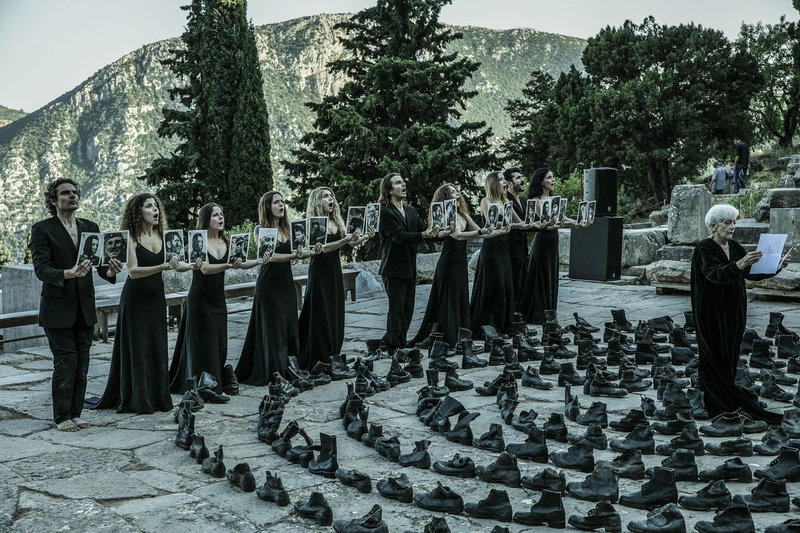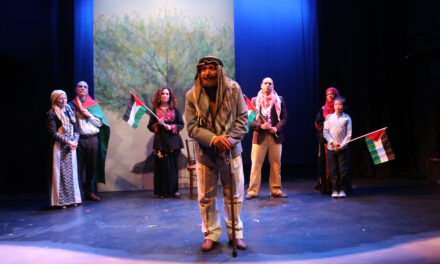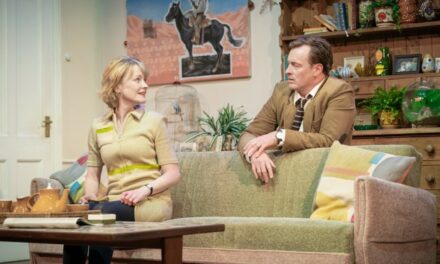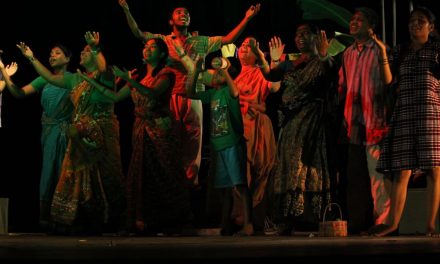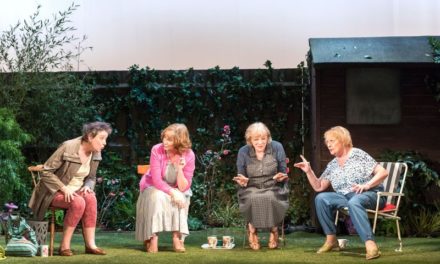A big tribute to the director and Euripides’ The Trojan Women at the Ancient Theatre of Delphi.
Of international repute, Greek director Theodoros Terzopoulos, founder of Attis Theatre, was for many years the Artistic Director of the “International Meetings on Ancient Drama,” organized by the European Cultural Centre of Delphi, where all renowned directors and academics gathered. This summer, Terzopoulos returned to Delphi due to the four-day-tribute organized in his favor by this major Institution in collaboration with the Onassis Cultural Centre.
The program of the tribute included Demonstration Workshops of Terzopoulos’ Method of Work with the participation of actors and directors from all continents, an International Symposium with the participation of theatre theorists and well known practitioners, like Eugenio Barba and Anatoly Vasiliev, parallel events, performances and projection of Attis Theatre documentary films, and the Greek premiere of Euripides’ The Trojan Women at the Ancient Theatre of Delphi, a production of Pafos 2017-European Capital Of Culture and of Attis Theatre.
Photography installation
The photography installation The Return Of Dionysos, by the photographer Johanna Weber was a parallel event. Weber’s photographs were displayed along the walls and the glass façade of the corridor of the Convention Centre. They were taken during Attis Theatre worldwide performances with Greek or foreign actors during their twenty-seven-year collaboration. They form a narrow strip built of body parts. An enlarged face expression, an arm extended in space, a roaring mouth, fragments of a performance, reminiscences, fragments of multinational bodies that put together, they could rebuild the torn body of Dionysos. For Terzopoulos, every performance of his theatre “Attis” incites a rebirth and a return of the Phrygian Dionysos.
In the Exhibition Hall of the Centre, after the intervention of the visual artist Alexandros Kokkinos, Weber’s photographs became huge, the bodies look menacing while at the same time the photographs were attached on a kind of hard aluminium foil in order to be used in constructions: an infinite arch based on an actor’s body, an elliptic sphere made from creased photographs of performances, a pointed rock constructed of actors’ body parts, eyes, mouths, torsos, arms, which had lost their proper place. It was as if the bodies were torn apart and reconstructed randomly.
Creative Soundplaces
Another parallel event was the sound installation by the composer and Terzopoulos’ associate Panayiotis Velianitis. The installation was titled Enopae which means woes, cries, clangs, and appears in Bacchae and in Homer. The installation was spread throughout the garden between the Convention Centre and the Hostel of the Centre and it was heard throughout the day. The music composition derived from the music composed for Terzopoulos’ performances and created a musical continuum of various tones and sounds, of very calm and comforting to bombings that was the soundtrack of The Trojan Women. The sound installation was perfectly integrated into the natural environment as if it derived from it.
Walking through the archaeological site of Delphi up to the Ancient Theatre under the afternoon midsummer sun was another exquisite experience. The performance began at 7 o’clock but the Ancient Theatre was protected from the sun by the giant mythological rocks of Phaedriades. There has not been a performance held in the Ancient Theatre of Delphi since 1986. The energy of the site is unique. The echo produced by the voices of the actors as they reflected upon the surrounding rocks brought back memories and testimonies from the performances held at the Ancient Theatre of Delphi by Eva Palmer-Sikelianos 91 years ago. Those performances defined the way the Modern Greek theatre approaches the Ancient Greek Drama. Equally important was the performance of Bacchae by Theodoros Terzopoulos presented in Delphi 32 years ago‒the starting point for his theatre world tour.
The Trojan Women: multidimensionally political
The Trojan Women under the direction of Theodoros Terzopoulos brought to view multiple political meanings: Euripides’ antiwar tragedy gave prominence to its multicultural identity by the participation of actors from different countries and languages. Based on its Cypriote origin/production and therefore the continuously divided capital of Cyprus, the nationalities of the actors were chosen accordingly: countries with divided cities because of wars and hostilities like Nicosia, Jerusalem, Mostar. Divided cities, divided people, the never-ending irrationality of power and interests.
The orchestra was full of army boots set in homocentric cycles. In the middle, the Chorus leader, the Turkish Cypriot Erdogan Kavaz, opened the performance with an astonishing Turkish mourning song. Despina Bebedeli as Hecuba applied Terzopoulos’ method with consistency. Having full control of her well known acting capacities, Bebedeli gave a lesson on how lamentation deriving from the inner body is expressed as a struggled woe unable to come out of an open mouth.
The girls of the Chorus performed parts of Cassandra’s speech each one in her language trying to follow the expressive tension that the director’s teaching demanded. It was most properly accomplished by the always surprising, Savvas Stroumpos’ associate, Evelun Assouad who recited the speech in Arabic because of her Syrian origin, as well as by the flawless in movement and with a deep, well-trained voice Croatian Sara Ipsa. Earlier, Cassandra’s speech was heard by Israeli Hadar Barabash, by Bosnian Ajla Hamzic, and by Greek Evelina Arapidi who had also performed the role of Athena.
Niovi Charalambous as Andromache created intensive moving images while Prokopis Agathocleous as Talthybius was in complete accordance with director’s demands and constantly acting on stage. Menelaus‒Helen’s episode was performed by two permanent associates of Theater Attis, Savvas Stroumpos and Sophia Hill.
In this scene, Terzopoulos took advantage of Euripides’ tragic twist with playful Helen and perplexed Menelaus who annuls Hecuba’s hopes of vengeance, to revisit post-Brechtian techniques of his former performances like Brecht’s Money Calls To Money, in order to elicit twisted sarcasm: Menelaus (S. Stroumpos) was on his knees crawling the whole orchestra with a steady masklike smile on his face and a metal glove on one hand that highlighted ironically his actually powerless disposition. Menelaus’ speech is ambivalent; in spite of Hecuba’s recommendations, he cannot deal with playful Helen. The latter, the impressive Sophia Hill dressed in a black robe covered with black feathers (a creation by the fashion-designer Loukia) appeared either hidden behind it or just letting slightly her full hypocritical embarrassment face show up accompanied by her gurgling vocals echoed in the theatre. She confirmed her title as the Beautiful Helen mostly with her vocal variations and less with her arguments. Despite being responsible for wars and destructions, she knows how to handle men as Hecuba warns submissive Menelaus.
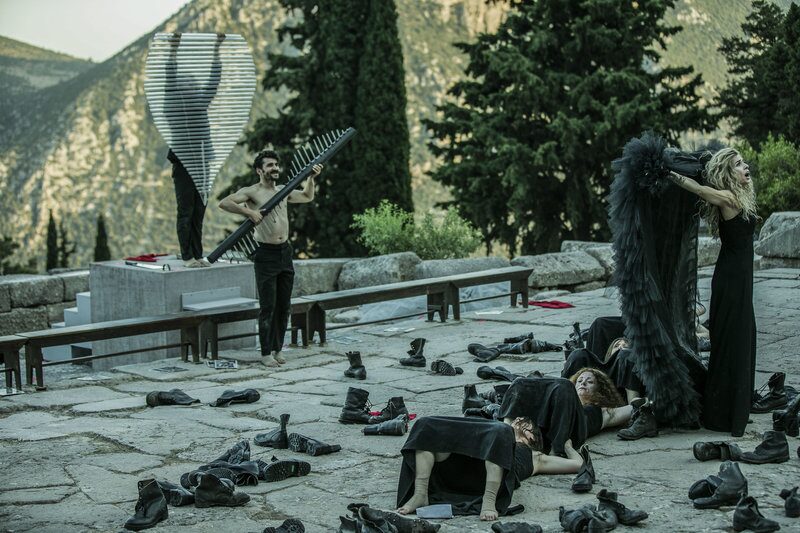
Euripides’ The Trojan Women by Theodoros Terzopoulos at the Ancient Theatre of Delphi, July 2018. Photo: Andreas Simopoulos
In the end, Hecuba alone said the reassuring “A day will come” which has become a leitmotif in Terzopoulos’ performances lately. It is a message full of hope for world peace, for solidarity, for demolishing the walls that divide cities and people.
Terzopoulos multiplied the meaning of the tragic text, updating it, without making any modern alternations on its body and following Kostis Kolotas’ smooth translation in Modern Greek. At the same time, he re-introduced multiculturalism as the text was spoken in different languages which were united by the actors’ shared experiences and realization of tragic truth. On the other hand, next to well known scenic object motives as the army boots, the photographs of missing persons or the red–bloody-clothes, some new ones were introduced, as, for example, a cloth in the form of a leaf that Talthybius unrolled as a symbol of the ships sailing or a figure dressed in black standing in the background as a symbol of death. In the same context served the musical sounds of Panayiotis Velianitis. The performance ended by the sunset; artificial lighting did not play an important role although Konstantinos Bethanis was in charge of it as always.
This fruitful tribute to Theodoros Terzopoulos by the European Cultural Centre of Delphi should be considered as a duty Greece owes to the international director. The Greek academic environment has honored Terzopoulos as he has been awarded honorary doctorates by the University of Peloponnese and by the University of Patras. But these honors are nothing but an obligation for his valuable contribution to Greek and international theatre.
Translated by Aikaterini Leoudi
This article originally appeared on imerodromos.gr in greek and has been reposted with permission.
This post was written by the author in their personal capacity.The opinions expressed in this article are the author’s own and do not reflect the view of The Theatre Times, their staff or collaborators.
This post was written by Dimitris Tsatsoulis.
The views expressed here belong to the author and do not necessarily reflect our views and opinions.

